#101 - 10 Portuguese Academic Traditions
In Portugal, there are many traditions and rites of passage associated to the various steps in Higher Education. For someone that is not familiar with this - like an Erasmus student - it may get very confusing since there are regional variations, from city to city and a lot of times it even varies from faculty to faculty.
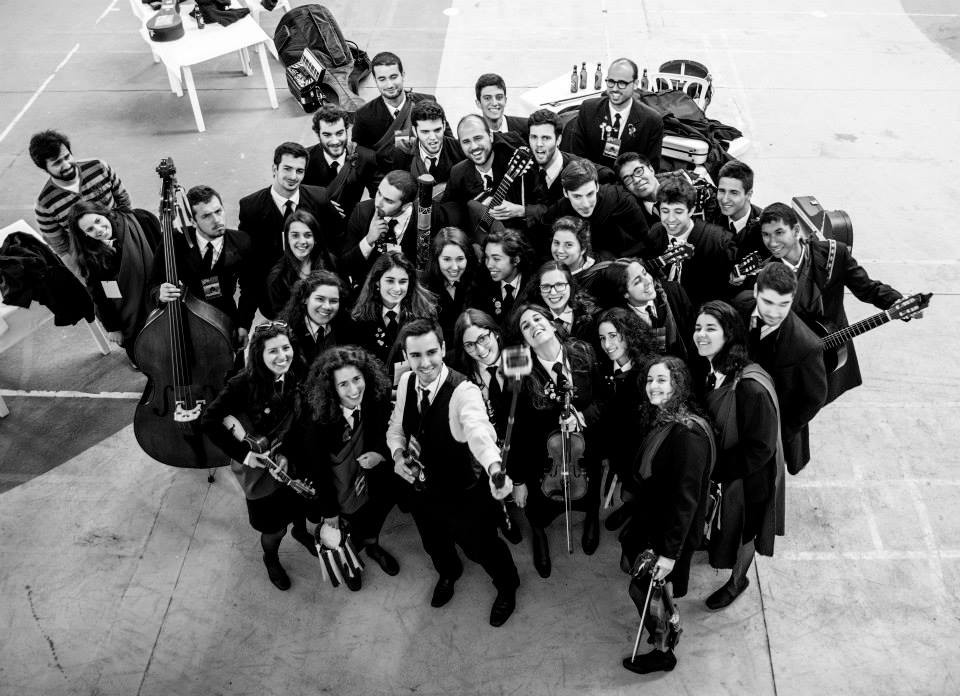
Naturally, the reality that I know best is the one from my faculty, the Faculty of Architecture from the Universidade de Lisboa. However, there are traditions and concepts that may be of interest to anyone who wants to know more about the world of Portuguese students.
So, I gathered 10 concepts that I think will give some context to the strange things Portuguese students do! This way, someone who has just arrived can maybe understand it better and tell the stories to their friends and family back home. Let's begin!
1 - Praxe
Let's start off with the most controversial tradition. The Praxe Académica is a series of activities for new students, done on their own free will, that aim to integrate the students and encourage interaction between students.
It usually lasts one week at the beginning of the academic year or even before that (like at my faculty) and it can continue throughout the year until the Tracar da capa, which I will explain later.
There is a Comissão de Praxes, a group of older students from the faculty who are responsible for the organization of these activities. These activities vary from faculty to faculty and generally include games, scavenger hunts, some mess and team work. The Praxe is usually closely followed by the academic community and marks the beginning of a new academic year and the reunion of students after the summer break.
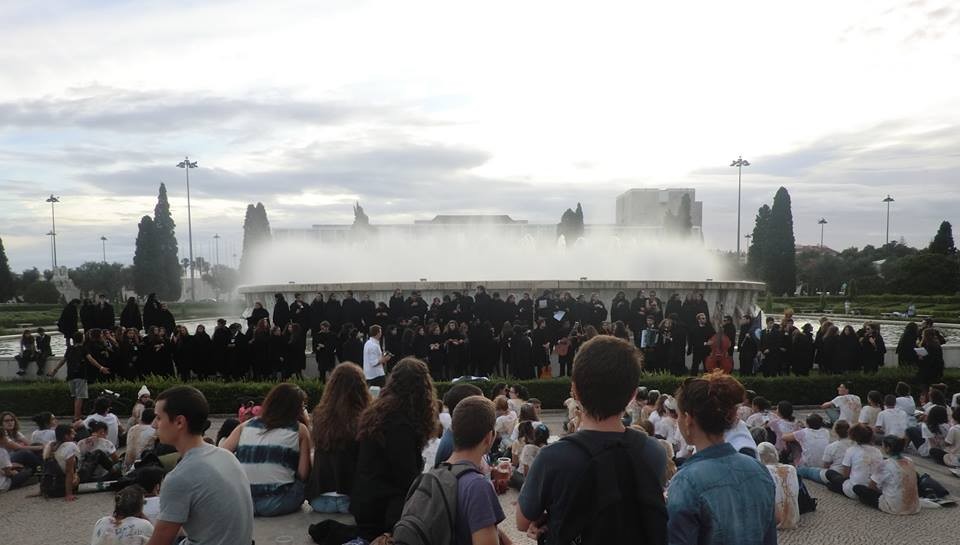
These last few years, the Praxe has raised a lot of controversy because there have been reports of abusive acts. It is a shame that the true purpose of the Praxe has been twisted and that stupidities have been committed. If you are interested in participating, I advise you to inform yourself about which traditions your faculty has by asking older students. To gather information is a smart way of making an informed and wise decision about whether to participate or not.
You can also look up videos from the activities from previous years!
Erasmus students, don't be scared! Nothing will happen to you, you are not in your first year any more. Make good use of the Praxe to meet new colleagues, there are always lots of parties and socials during the first week. It is also fun to accompany the activities when these are performed in the city, because you not only get to know the city better but you also get to see the competitiveness of the students in the team games.
In case you think the Praxe makes no sense and there is no purpose of integration in the activities, it is your duty to report this to the responsible parties at your Faculty.
2 - Baptismo
The Baptismo is another symbolic phase that is part of belonging to your new faculty, for those who decide to participate in the Praxe.
It generally occurs at the end of the Praxe week or at the end of the academic year, just before the ceremony of the Tracar da Capa.
At the end of the Praxe, the younger student chooses an older student, one male - the Padrinho - and one female - the Madrinha (in some faculties you only choose either one or the other). They must be people who represented good values and are representative for the faculty. In my faculty the request to be someone's Madrinha or Padrinho has to be made in a formal and creative way.
For example when I requested for my Padrinho Académico, I brought a box of typical cakes from my home town and I wrote a poem. The important part is to be creative and make the moment memorable.
In conclusion, the Praxe should be a time of joy, sharing and fun. When it becomes more than that, it is your duty to report it.
Have fun!
3 - Traçar da Capa
The Tracar da Capa is a ceremony that occurs at the end of the first year of college. The student, so far considered a freshman, starts wearing the traditional Traje, this is a traditional suit and cape that is symbolic of the Portuguese Higher Education students.
Normally, before this ceremony, there is the buying of the Traje, usually done in the company of the Academic Padrinho and Madrinha in the special shops. It is important that the Traje fits perfectly for the ceremony.
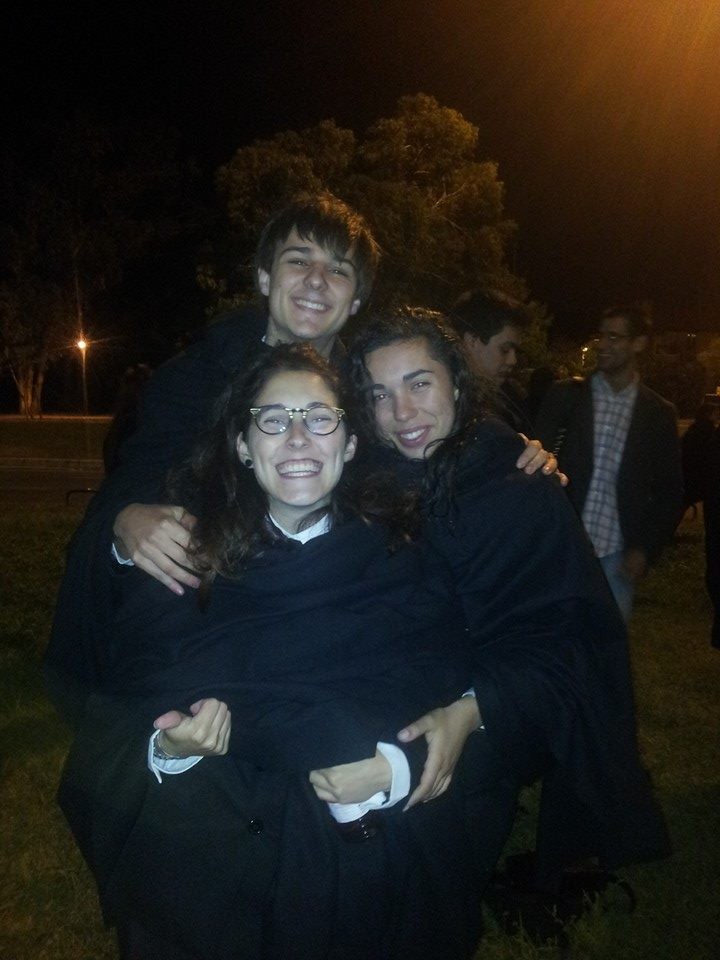
At the Tracar da Capa, and this varies by faculty once again, you usually assist the Serenata, which occurs in Lisbon in front of the Reitoria da Universiade de Lisboa, in Alameda Universitária: A musical serenade performed by the Tunas of the city before the ceremony.
Then the freshman go one by one to their Madrinha and Padrinho and take their student cape and do the "tracar", where they cross it over the students shoulder in a specific way, crossing it over as many times as years the student has studied. In this case, one. This is a very important moment, usually the Padrinho and Madrinha leave a message to their student and it normally ends with water or beer being thrown over the Traje Academico.
From that point, the student may wear their Traje Academico at all the academic events from the faculty, and he or she may then also become someone else's Madrinha or Padrinho in the next year.
4 - Quinta Académica
Quinta-feira Académica (Academic Thursday) is the day that the bars and clubs in Lisbon usually promote parties at cheaper prices for University Students. And why Thursday and not Friday, why right before the weekend? Because most students go back to their home towns on the weekends to visit their families, leaving on Friday afternoon.
So that everyone can celebrate, it was established that academic parties will be held on Thursdays. Not that there are no parties on the other days, but on Thursdays there are the most awaited parties and where the prices are on more of a student level. The same goes for Erasmus students! Lisbon is a beautiful city by night and has a great night life. There are more than enough Bars and Clubs with music for every taste!
5 - Queima das Fitas
This is another ceremony, which unlike the Tracar da Capa that happens at the end of the first year, happens at the end of your academic journey. For those with an integrated Masters degree, it happens only at the end of the 5th year, for those with only a bachelor it happens at the end of 3rd year. It is a very formal ceremony that usually takes place during the afternoon after the Bencao de Finalistas, where the whole academic community participates, including the students' parents.
Usually, the students dress smart for this occasion but it is not only for students with the trade. The students are called by their full name, one by one. The student approaches a big pot with embers where he or she must burn the half of a black ribbon, where they may write the bad happenings from the last years so that they may remain in the past.
It is merely symbolic of course but it is a nice way of ending your degree, at a ceremony where all your colleagues and parents are present and where there is a formal goodbye to your college days and you welcome your new life as a working member of society.
6 - Benção de Finalistas
This is the religious ceremony that precedes the Queima das Fitas In Lisbon, all the finalists gather at the Alameda das Universidades, in the Cidade Universitária for a mass given by the Cardinal of Lisbon, to bless the future of the graduates.
Even those who are not catholic often take part in this ceremony, since over the years the ceremony has become more banal. The students are organized by course in big spaces and there is often a more personal message given to the various student groups.
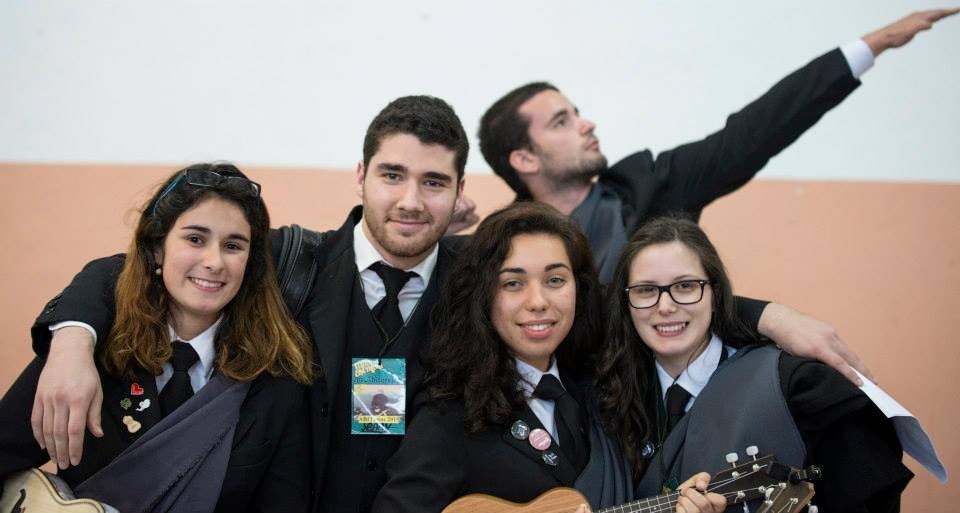
7 - Tuna
A Tuna is a musical group from a Portuguese faculty. They also exist in other countries, like Spain, but they are not exactly the same.
Generally, the students play traditional instruments and classic Portuguese songs. The songs have roots in the Portuguese Fado and the traditional popular songs.
Usually, there groups organize festivals where several Tunas participate, as a competition or not, and they also organize Serenades, where they sing around the city, usually love songs. The tunas can be Male of Female - as they traditionally were - or Mixed, like the Tuna from my Faculty
In my first two years of college I was part of a Tuna and it was a very good experience. I learned how to play ukulele - my Tuna was a bit avant-garde - how to sing in tune and I made good friends.
Now I don't have time, I have too much to do, I can't commit to two rehearsals a week but every now and then I go and watch them perform.
For the Erasmus students in Lisbon, I recommend to go and see the Serenades from the various Tunas, they usually occur at the end of the year and 2nd semester, around April and May, when the weather starts to improve.
8 - Traje Académico
The Traje Académico is the black suit and cape used by the University students all over the country. There is a Nacional Traje Académico used by most faculties across the country and then there are regional variations, for example, in the Algarve, in the Azores and in Beira Interior. These have different Trajes and they get details for their Trajes in local activities that represent their region.
The Traje was created at the beginning of the XX century in Coimbra, the city where all the academic traditions were created. It had the purpose of creating equality between students, so that the difference of class could not be seen in their clothes. Currently, unlike in the past, you don't always wear it, only on special occasions.
There is a male version that consists of black trousers, white shirt, vest, cape and varnish shoes. For the girls there is a skirt, jacket and heels. The cape is for both of them. Some say it is not comfortable but I have slept many nights in mine.
It is a memory that remains from your students days and that can be reused since it is formed by classic pieces, even though the quality in some shops is not great.
9 - Fitas
The Fitas are ribbons. They are an element for those who reach the end of the course. The students swap ribbons between them and their closest friends and family. Those who get the ribbon must feel honoured and write a message of luck for the student. At the end the ribbon is returned to the student so that it takes place in the Pasta Final, this is a briefcase. It is a memory that remains and a nice message to be reread in the future.
Officially, the messages are only to be read on the day of the Bencão and the Queima das Fitas. The ribbons can have different colours according to the faculty and the course. It is maybe one of my favourite traditions and every time I get a ribbon I try my best to write a beautiful message and decorate it the best I can.
10 - Caloiro
This is the name given to 1st year students until the day of the Tracar da Capa. It is merely a name; there are also names for students of other years, which once again varies from faculty to faculty.
I hope this article is helpful for you, I know it is difficult to understand this world of Academic Traditions. It reminds me of great nights in Lisbon!
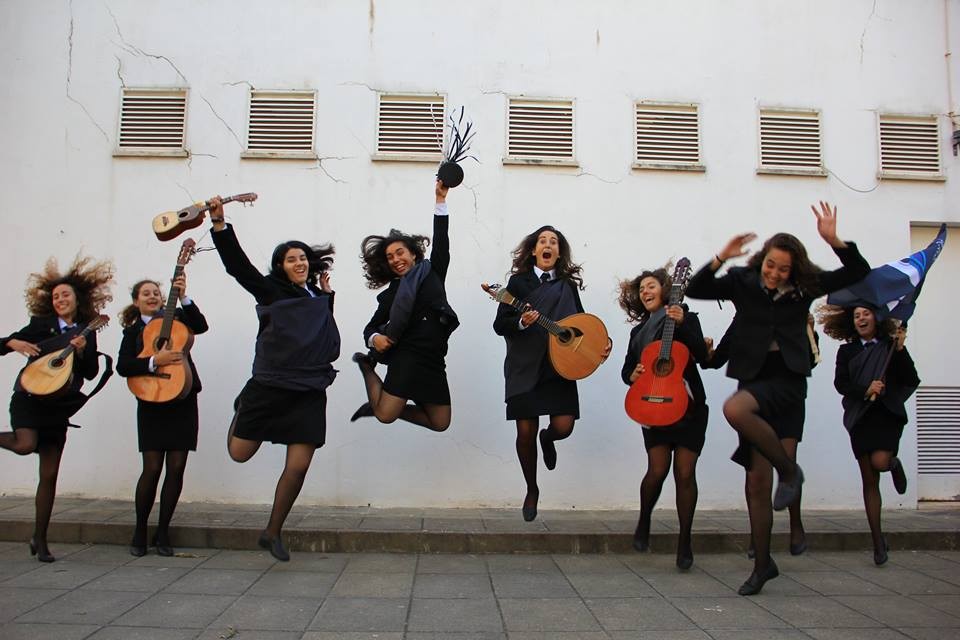
Photo gallery
Content available in other languages
- Português: #101 - 10 Tradições Académicas Portuguesas
- Italiano: #101 - 10 Tradizioni accademiche portoghesi
- Nederlands: #101 - 10 Portugese Academische Tradities
- Español: #101 - 10 Tradiciones Académicas Portuguesas
- Polski: #101 – 10 Portugalskich Tradycji Akademickich
Want to have your own Erasmus blog?
If you are experiencing living abroad, you're an avid traveller or want to promote the city where you live... create your own blog and share your adventures!
I want to create my Erasmus blog! →








Comments (0 comments)